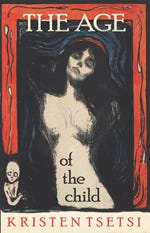
“There’s nothing worse than being ordinary,” high schooler Angela, played by Mena Suvari, pouts in 1999's American Beauty.
There is something worse, though: being ordinary and childfree. In America, at least.
In the years since I started paying attention to, and writing about, childfree topics, I’ve seen some version of this many times:
If I don’t have kids, I’d better do something exceptional with my life.
At first I understood it to mean, “I’m not performing the exceptional act of motherhood, so I’d better make up for it by doing something equally exceptional.”
That confused me for a long time, because I couldn’t figure out what was exceptional about having a child. Most biologically capable humans have always done it.
More recently I came to understand that it means, “I have all this time that I wouldn’t otherwise have if I had kids; therefore, I have no excuse if I don’t achieve something extraordinary.”
Sam Goldstein, PhD, Clinical Director of the Neurology Learning and Behavior Center, writes in Psychology Today, “Being average has become a subtle failure in a world consumed by the extraordinary.”
A subtle failure for “regular” people, maybe. For the childfree woman, not achieving something great is a full blown tragedy, because we are average without children.
It’s easy to be a childfree woman if your “alternative” to children is something the masses agree is impressive — like being famous.
Most of us aren’t famous. We never will be. Yet, every time we in the childfree community choose women living 1% lives to be our representatives, we reinforce the idea that we really should do something extraordinary to “make up for” or explain our not being mothers.
Look at Cameron Diaz! She’s childfree, and she’s fabulous and famous! we said.
The response from whoever we’re talking to: Yeah, but she’s Cameron Fucking Diaz. That’s what she did without kids. What’re you doing?
Us, to ourselves: I do have all this time and freedom. Why am I not doing more?
Like it or not, us simply enjoying life often doesn’t seem like enough, to ourselves or to anyone else, in a capitalist society that prioritizes money and fame.
And, of course, motherhood.
Money, fame, and motherhood are the three terminal degrees in Life a woman can achieve. She need accomplish nothing more.
We put pressure on ourselves when we lionize childfree celebrities
I’ve been confidently childfree since I, at 20 years old, told my first husband that I didn’t want kids. Even so, thirty years later I’m still not immune to being embarrassed by being utterly unexceptional, by having not achieved more with my time and freedom.
I should have done better professionally because I didn’t have a child’s need for food and clothing keeping me tethered to some go-nowhere job.
I should have tried harder, should have put in 24/7 effort because I had no children requiring my time or attention.
I should have been more ambitious, chasing down networks and attending events all those days and nights I didn’t have to make kids dinner or put them to bed.
On a recent day when my unrealized dreams had piled a little too high, I thought (again):
“I should have had kids. At least then I’d have an excuse.”
It sounds like a throwaway line, something that comes with an eye-roll and a fake laugh. But it’s a heavy acknowledgement of a depressing reality. It scrapes deep down where the pressure to do exceptional things has burrowed.
“I should have had kids. At least then I’d have an excuse.”
Even though having kids is, as any pronatalist will tell you, “simply what women are supposed to do” (and therefore not remarkable), motherhood is automatically assigned Premier Status value.
It was this truth that informed the character Millie in my novel The Age of the Child, who lives in a post-Roe era when having children requires a license and must be sanctioned by the government. Those who pass the licensing bureau’s strict evaluations are considered superior in all ways that matter: emotionally, psychologically, morally.
I wasn’t conscious of it while writing, but I’m sure I was using Millie to express my frustration with the automatic — and blind — reverence granted to mothers. No matter how many stories of child abuse or fatal neglect wriggle through cracks in the propaganda, “mother” remains an unassailable role.
Because of that, in my less-than-proud moments of professional frustration and self-pity, I get as close as anyone who never wanted a child can get to what might be called “regret,” because I know having kids would have absolved me of all responsibility for my personal failures.
For being ordinary.
“There is profound peace, purpose, and even beauty in living an average, unremarkable life,” Goldstein writes in the previously mentioned Psychology Today piece.
Easy to agree with; harder to internalize.
A “childfree” celebrity might also have a change of heart
We don’t damage only our psyches by increasing our expectations of ourselves; we also damage our credibility when we latch onto childfree celebrities who could change their minds about children at any time.
Like Cameron Diaz, who became a mother five years after saying she “was never drawn to being a mother.”
Her revised opinion was that having a child was “the best thing that ever happened to both [husband] Benj and I.”
Childfree people get angry when childfree celebrities do this, because the celebrity’s change of mind inevitably leads to a told-ya-so, like this popular post on social media in which a male voiceover narrating baby-news video of Cameron Diaz says Diaz “wasn’t keen on the whole idea of having kids; that is, until someone special made her think twice.”
Queue the reply to I don’t want kids: “You will when you meet the right man — just like Cameron did!”
Celebrities don’t mean to betray us. They’re just living their lives.
It’s we the childfree who held them up as representatives, who used them as avatars of our own position, who have betrayed ourselves by putting trust in perfect strangers to forever be our mascot.
We pie ourselves in the face every time we do this.
It’s already assumed, without any help from a role model gone rogue, that we’re uncertain of who we are and what we want.
We’re at a disadvantage from the start, automatically suspect — not only when it comes to our character (what kind of woman doesn’t want kids?), but also when it comes to our judgment (what kind of woman would find anything more interesting or more important than motherhood?).
So if someone like Cameron Diaz — a Very Special Person because she’s famous — could change her mind about motherhood, obviously we can be dismissed any time we say we don’t want kids.
The result is worse than some random life choice being disregarded; we are disregarded. Celebrities we hold on high for choosing not to be mothers and who change their minds, or who, as with Jennifer Aniston, we mistakenly put on pedestals as childfree, make it easier for others to take for granted that women cannot be relied upon to know what we want.
Unless what we want is a baby.
I like that there are famous childfree people. That is, I like that there are famous people who aren’t quiet about their choice to not have children.
Their presence in the media (social or otherwise) is critical. A girl growing up in a traditional-values town or household is less likely to be introduced in any other way to the notion that having a child is a decision, not a requirement.
Famous people spread awareness in a way we lesser- or unknowns can’t.
But that’s where celebrity influence in the childfree sphere should end: with those who need to hear the good news about choice.
We, the already childfree, don’t need famous people to validate our lives.
To simply have made the choice is more than enough in a world where too many women and girls are either unaware they have a choice or are being pressured into not exercising it.
We don’t have to be extraordinary.
We can just be.
*
Originally published in Life Without Children on Medium
Thank you for reading! If you got something out of this, you might also get something out of my 2017 novel The Age of the Child, in which a repeal of Roe v. Wade has unanticipated consequences that take a surprising turn from one generation to the next. “Total page turner. A voice & perspective we rarely see in literature.” - Amazon reader | Available wherever you buy your books.





